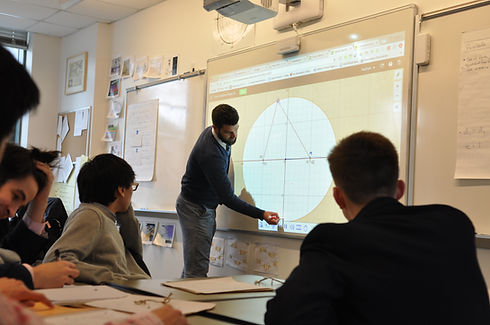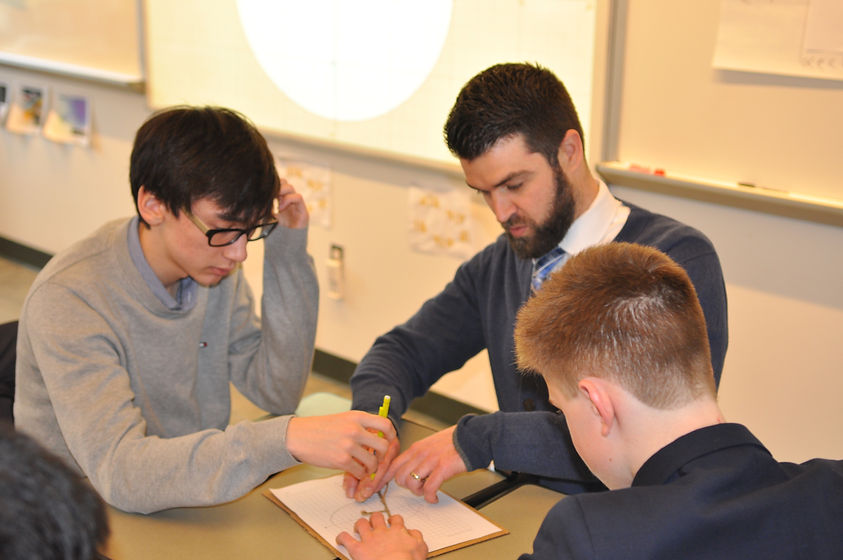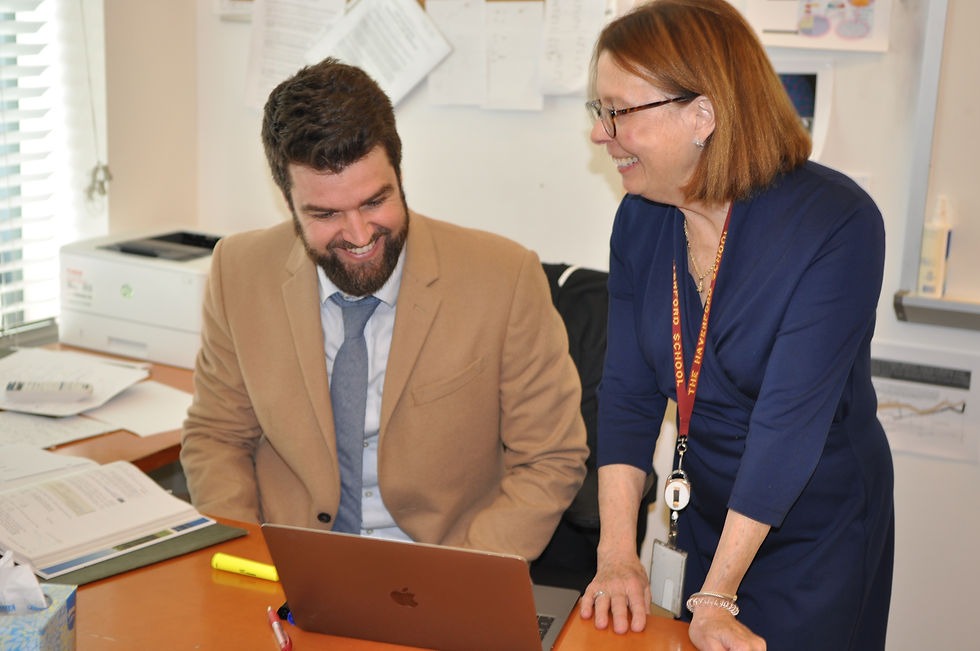
NATHAN BRIDGE
Haverford School Mathematics Teacher

TEACHING PHILOSOPHY
The guiding objective for my class is to develop a collaborative learning environment for my students. The abilities to listen critically and communicate ideas effectively are the most important skills that our students can take with them throughout their personal and professional lives. These skills are essential for aspiring leaders who intend to affect positive change in the world in which they live. In my experience, students struggle to see the relevance of these skills in the context of mathematics. For many students, the language is foreign, the ideas are abstract and students have come to believe that mathematics is an exercise in memorization. My philosophy is that mathematics is a skill in the construction of ideas through inference and induction. Therefore, my primary concern is to create a culture of collaboration and community so that students can contribute their talents to the class.
In order to develop my classroom’s culture, I collaborate with my colleagues in the math department to research and design tasks that facilitate group work, address multiple intelligences, assign confidence to low-status students, prompt students to think critically about “big ideas” using multiple mathematical representations, and challenge students to communicate their reasoning in response to open-ended problems. I prioritize lessons and assessments that value students’ critical thinking rather than their ability to compute the “right” answer. I believe developing students’ meta-cognitive thinking skills fosters independent learning and self-understanding and so I implement mathematical journal writing and collaborative projects that require self-assessment. I employ complex instruction techniques to facilitate student learning rather than portraying myself as the primary source of information. I approach my classes with the multicultural perspective that knowledge is not something to get and be given, but rather that as something created through shared understanding. Ultimately, my hope is that my students will leave my class feeling empowered by what they can achieve, not simply by what they know.
OVERVIEW OF COURSES TAUGHT
2018-present
PRECALCULUS HONORS
This is a course in advanced topics in Algebra and Trigonometry. We will cover everything from exploring an entirely new, some say more intuitive, coordinate system, and then use it to analyze in even more depth all your favorite algebra topics like conic sections, vectors and complex numbers. We even have the opportunity to learn more formal methods of mathematical proof and introductory topics in Calculus. This course isn't quite sequenced like those that have come prior. In Algebra I, Geometry and Algebra II there was a distinct linearity of concepts where one topic built on and necessarily led you into the next. In PreCalc*, the journey leads us to dabble into many quite distinct and discrete skills and ideas. This is actually, in many ways, the course that sets you up for Calc II* and increasingly complex applications in Engineering and Physics. So if you love exploring new things from scratch, if you love abstract challenges and nuanced conceptual conversations, and if you love engaging with math on a deeper intellectual level, then this is the class for you!
2018-present
ALGEBRA I
This is a class for students who bring with them a wide variety mathematical experiences. Some have had Algebra before, some are new to Algebra but have already learned a bit of Geometry, and others have had robust experiences with Problem and Inquiry Based Learning at the Pre-Algebra level. But one thing will be true of this class moving forward: By the end of the course, everyone will have had the opportunity to develop a rock solid foundation in Algebra to catapult them forward into their future math courses. The course is designed to centralize students in the learning process so that we can utilize all talents and expertise to the fullest. We will learn and re-discover the concepts and skills of Algebra by doing deep dives into rich problems. The teacher serves as the facilitator of this experience, to set up the learning tasks and to be there as support, but expect to really be in the driver's seat. So go into this class with an honest and open mind, a willingness to be brave and take risks, and respect and love for your classmates, and you will come out of the class not just a stronger math student, but a young man of even stronger character.
2017-Present
FORM III ADVISORY
I have enjoyed being a Form III advisor for three years now at The Haverford School. In previous schools, I have predominantly been assigned to 8th and 9th grade homerooms, and I simply find the students' experience of transitioning from middle school to high school fascinating, complex, dynamic, exciting, scary, and inspiring, and I love supporting them every step of the way.
2017-2018
GEOMETRY STANDARD
I once had a student who said that Geometry was essentially the mathematics of space. Take a minute and look around. Notice everything about the physical space you can possibly see: the sizes and dimensions of the shapes, the corners and grooves that connect and bend the surfaces. If mathematics has the power to quantify features of our lives for the purposes of analysis, imagine an interconnected mathematical system that can help us to analyze the physical space we live in.
2017-2019
CALCULUS STANDARD
“Algebra is like snapshot photography, Calculus is like video motion.”
“Calculus was the first time I began to understand the purpose of infinity, from a math perspective.”
“All those times I asked in a math class, ‘...when will I ever use this?’ That question was answered in my Calc class.”
“The Fundamental Theorem of Calculus....Darth Vader is Luke’s father, Bruce Willis is dead, Verbal is Keysar Soze. I was like Link."
These are literal quotes from my past Calc students. Needless to say, Calculus made quite an impact on them. I think it’s because for them, the “preparation work” of algebra and pre-algebra arithmetic finally came to fruition. The concepts of Calculus are intellectually complex and imaginatively thought-provoking. The techniques range from straightforward (simpler than long division!) to intricate (and heavily incorporate algebra). The applications are purposeful and get at the mathematical foundations of theories in the Natural Sciences such as Physics and Biology, and the Human Sciences such as Economics and Geography. All of Calculus is composed of two branches - Differential and Integral - each originating from it’s own distinct mathematical quandaries and each with its own set of powerful applications, but ultimately, seemingly magically, interconnected in unforeseen ways.

NATHAN BRIDGE BIO
From Philosophy to Mathematics
At first glance, my educational background may not immediately demonstrate a straightforward path toward becoming a math teacher. I first became interested in teaching mathematics after I completed my MA in Philosophy from the University of Chicago. I was teaching Philosophy courses at Harold Washington College in Chicago and since I had written my thesis on the qualities of truth-predicates in ethical statements, I was peripherally curious about the nature of truth-predicates in mathematics as well. But my interest in mathematics became less theoretical and more pragmatic while I was teaching a course on Symbolic Logic...




GET IN TOUCH
The Haverford School
450 US-30
Haverford, PA 19041
610-642-3020 x1341





